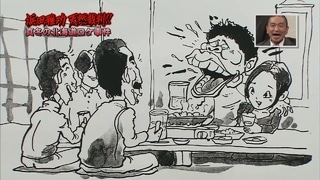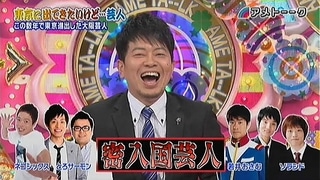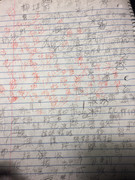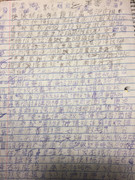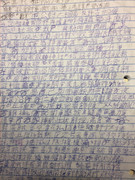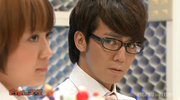This post is about the following words that I will write here in romaji on PURPOSE.
NETABAKO
BAKAGIRI
METTAGIRI
TETSUKAZU
I was prompted to write this entry when I figured out why I wrote this lang-8 entry in 2011!
 I wrote on lang-8 that bakagiri reminded me of METTAGIRI due to the similar pronunciation. I think the number of moras is different between these words because of the double ttsu but I’m too lazy to check the definition of mora. Dogen did an excellent job explaining it in video but I don’t remember the details since I saw his pitch accent videos a year ago and I have re-watched none of them. They definitely have the same number of syllables according to Japanese wiki which says
I wrote on lang-8 that bakagiri reminded me of METTAGIRI due to the similar pronunciation. I think the number of moras is different between these words because of the double ttsu but I’m too lazy to check the definition of mora. Dogen did an excellent job explaining it in video but I don’t remember the details since I saw his pitch accent videos a year ago and I have re-watched none of them. They definitely have the same number of syllables according to Japanese wiki which says
但し、長音、促音、撥音(ん)だけは、音節区切りでは、前の音といっしょに数える。
Of co urse no one in the comments pointed out that I heard it like that because of the pitch accent! I wrote that I watched an m-station episode clip where they’re interviewing shiina ringo and they weren’t subbing ANY OF IT. I solely relied on my ears and I made out BAKAGIRI. I had to find out what that means so I googled and luckily I was able to find a transcription on a Japanese blog by searching key words with quotes.
urse no one in the comments pointed out that I heard it like that because of the pitch accent! I wrote that I watched an m-station episode clip where they’re interviewing shiina ringo and they weren’t subbing ANY OF IT. I solely relied on my ears and I made out BAKAGIRI. I had to find out what that means so I googled and luckily I was able to find a transcription on a Japanese blog by searching key words with quotes.
I noticed that Shiina Ringo pronounced bakagiri as if there is a “break” after “ka” like baka / giri. This word in the turn of phrase reminded me of めった切り which is a wonderful word I learned from the drama JIN at the time. So based off that バカ切り ran through my head just because it sounds likes mettagiri. Of course I don’t know if such a word exists and once I saw the transcript I realized it’s definitely not バカ切り. I end up finding out it’s the set phrase SONO BAKAGIRI rather than just bakagiri and more importantly I’m pretty sure if I had ran into that word at that time in written text rather than in video/audio, I would’ve read it with a “break” after ba like ba/kagiri because I didn’t know any better and would’ve assumed that that’s how it is pronounced based on the kanji that comprise the word. Or perhaps I was expecting kagiri in bakagiri to be pronounced the way kagiri is pronounced when it’s by itself and that is a word that is used a lot more frequently than sono bakagiri. I keep putting the word break in quotes because that’s how I described it then but I now realize it’s the pitch accent I was hearing.
I w as reminded of my old lang-8 entry when I saw a comedy sketch titled HERO by the comedy duo saraba seishun after watching a God Tongue episode that featured this comedy duo. They made saraba seishun perform “HERO” but completely cut it out of the God Tongue episode.
as reminded of my old lang-8 entry when I saw a comedy sketch titled HERO by the comedy duo saraba seishun after watching a God Tongue episode that featured this comedy duo. They made saraba seishun perform “HERO” but completely cut it out of the God Tongue episode.
So the “Hero” keeps saying netabako with what I hear as a break after “ta” as in neta/bako. The video is not subbed so I’m thinking ネタ箱 ? wtf is that? sushi box? box full of comedy material/jokes? As the video went on, he says it over and over again so eventually I figure out what he means since it’s really obvious from the context. Like BAKAGIRI I was expecting the “split” to be after ne like ne/tabako when I found out what the word meant.
I had yet another similar experience when I was listening/watching DARAKE when yomeda (yoneda?? I am too lazy to look up the woman’s name) said TETSUKAZU. I heard what I perceived to be a split after TSU as in tetsu/kazu . So I thought of 鉄 ___ テツトモ just from hearing it. This time the text was on the screen so once I saw the text I realized I had been bamboozled again! For some reason I got distracted by what I perceived as the “break” to the point that I don’t derive the meaning from the sound of the word since I know this word! Among BAKAGIRI, TETSUKAZU, NETABAKO, the only word that I didn’t know was bakagiri. For tetsukazu and netabako, I knew these words but I either have not heard them being said many times or it was my first time hearing the pronunciation; the dissonance between reality and my expectation hindered my comprehension.
 <— (love this girl! I also miss NEZZUCHI !)
<— (love this girl! I also miss NEZZUCHI !)
I think the only pitch accent patterns that would give me that perceived “break” after the first syllable would be ATAMADAKA or HEIBAN. On atamadaka words, the pitch accent starts HIGH then goes low after the first mora (In dictionaries they use 1 to denote atamadaka). For heiban words, the pitch accent starts low on the first mora then goes up high and stays high until the end of the word (They use 0 to denote heiban words in dictionaries). As I’ve said, that is not the case for these words. They’re all NAKADAKA which means the pitch accent goes up somewhere in the middle word and goes down right afterwards. I think I hadn’t heard about pitch accent in 2011. I can only assume that in 2011 that I was expecting the word to be pronounced heiban purely based on how the word is  written since I didn’t know about the existence of pitch accent. It’s not unreasonable since heiban is the most popular pitch accent pattern in Japanese. I’m proud that I was able discern that what I was hearing was not what I was expecting even if I could only explain it using the word “break.” But then again, I also seem pitch-accent deaf since I thought the bachigai was pronounced differently from bakagiri. They actually have the same pitch accent!
written since I didn’t know about the existence of pitch accent. It’s not unreasonable since heiban is the most popular pitch accent pattern in Japanese. I’m proud that I was able discern that what I was hearing was not what I was expecting even if I could only explain it using the word “break.” But then again, I also seem pitch-accent deaf since I thought the bachigai was pronounced differently from bakagiri. They actually have the same pitch accent!
 Here is a copy paste of the dictionary entries for the words with the pitch accents. The syllable with the the line over it is the one that gets pronounced with a higher pitch accent.
Here is a copy paste of the dictionary entries for the words with the pitch accents. The syllable with the the line over it is the one that gets pronounced with a higher pitch accent.
Also, you can listen to the pronunciation OF THE WORDS on NAVER DICTIONARY. Just paste the word into the search bar and click on the speaker next to the word! The audio for speakers with the text TTS next to it are inaccurate.
てつかず | てつかず **
【手付かず】[3][2] This word can be pronounced with the higher pitch accent on tsu or ka. According to this dictionary, the accent on ka is more common than tsu since the order is 3, 2. Both are correct nonetheless!
まだ△手をつけていない(使っていない)こと。
「―で残される/―の△状態(まま)」
そのばかぎり [4]
その場限りの約束 a promise made on the spot (and broken later)
そのばしのぎ
4 [その場凌ぎ·其の場凌ぎ = 일시 모면; 임시방편[변통].
そのばのがれ
4 [その場逃れ·其の場逃れ
ばちがい
【場違い】【場違】[2] (一)その場所△に居る(でする)にはふさわしくないこと。
「―の服装/―の議論」
めったぎり [0]
【滅多斬り】所かまわず斬りつけること。めちゃめちゃに切ること。
み かぎり
[0] 【見限り】 I looked up words that end in kagiri just to see if they just all happen to follow the same pitch accent and of course they don’t.
(1)見限ること。
(2)(多く「お見限り」の形で)客などが顔を見せないこと。「すっかりお―ね」
かぎり | かぎり
한, 끝;한계, 한도;…껏
げたばこ
たばこ
ねたばこ
【寝たばこ】[2] 〔△起き(寝)がけに〕
寝床の中でたばこを吸うこと。また、そのたばこ。
ふでばこ
筆箱
I also remember being bewildered by the pronunciation of kakushigoto when I first heard it since I knew the words kakusu/kamikakushi/koto/etc. I was expecting hear the split after shi like kakushi/goto just based on the words that make up the word but that’s not how they pronounce it. The way it was pronunced reminded me of shigoto/yattsuk shigoto etc.
こと
0 こと
かくしごと
かくしごと
[隠し事]
0 or 5
かくし
[隠し]
3
しごと
[仕事
0
かみかくし
神隠し
3
やっつけしごと
5 [やっつけ仕事·遣っ付け仕事]
I highly recommend using a site like lang-8 (they don’t allow new sign-ups ) because it ends up being a record of your skills. Also, like me, you may end up answering your own questions many years down the line.
UPDATE 4-2022
had the same thing happen with 日めくりカレンダー on a recent god tongue episode! so ogiri/quiz shows etc repeat the same sentence OVER AND OVER AND OVER again.
here’s the pitch accent receipts on naver since jisho sucks like that. ひめくり
so this was one of the prompts
~ 錦鯉・渡辺からのお題「まさのり日めくりカレンダーに書いてある一言とは?
so from the first go I was like woah they’re pronouncing himekuri like himawari when i was expecting them to pronounce it heiban ie gakusei even though i haven’t heard it that many times. then they kept saying that sentence over and over again and it made himekuri seem like such a fun word to pronounce and i remembered how to pronounce it properly.
btw karenda- calendar is the same pitch accent so it’s on the RE. can’t hear it as clearly for himekuri to be honest. hopefully it’ll pop out to me one of these days.








